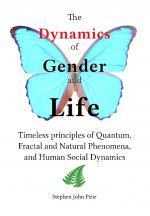[Excerpt Be and Become, © ProCreative, Sydney 2000]
Key Concepts:
- The belief in “separateness” (i.e. that everything and everyone is separate, local and limited) is the root cause for the world’s ills. In an analogous sense, we are children, not yet having learned how to relate to others (other species, other races, “inanimate” objects and ourselves).
- The belief in “separateness” causes humanity to focus on loss, pain and limitation. It separates (denies and ignores) our potentials for an inner-spiritual awareness and creativity, causing unnecessary upset, turmoil and difficulty.
- This belief-system fuels competitive, combative behavior. It fuels the mechanistic scientific view that we are merely a lucky coincidence of molecules.
- The belief in “separateness” allows the development of the belief in spiritual perfection (reliant on a separation between 'here and now,' and some ideal 'other' state).
- Similarly, this philosophy leads to a belief in scientific certainty (reliant on perfection of knowledge and measurement) in which matter, energy, people, plants and planets can be fully understood by analysing the component parts (reductionism).
- The belief in “separateness” is due to humanity’s immaturity. In terms of human development, we are in late adolescence, nearing adulthood. For the last few hundred years (during the industrial era) we have overly focused on the “masculine” qualities of difference, technology, objectivity and individuality, much as many adolescent males do. Hence Western science’s dismissal of the “feminine” aspects such as cooperation, interconnectedness and the “spiritual.”
- Generally, those who believe in separateness and who are religious (in a traditional conservative sense) see our Father (spiritual source) much as any child sees its parent—as omniscient (all-knowing) and perfect (without fault). Refer Table 7.6.
- The belief in “separateness” causes a focus upon distinctions and division. It fuels the development of unrealistic ideals of right and wrong, good and bad.
- Believing reality to be local and that perfection is ultimately attainable, leads to the denouncement of physicality as being a step-down state of lesser importance than some ideal spiritual state.
- The denouncement of physicality leads to the denouncement of the conscious ego, intellect, reason, sex and physical pleasure (hence the perceived virtue of celibacy and abstinence in conservative, religious cultures).
- Our Western bias towards the physical (the finite, the factual and the manifested) has engendered a mindset steeped in competition and limitation. Biological species are believed to aggressively compete for limited resources. Hence the 'natural selection' of 'survival of the fittest' theories, rooted in competition for limited resources, mates.
- Science and religion are 'sister-belief systems' - each being rooted in a perceived 'separateness' reliant on disconnection, limitation and objectification of physical and spiritual reality, respectively.
- Since the future affects the present, current Western scientific theories such as evolutionary biology are fundamentally inadequate and cannot fully account for evolutionary developments.
- “Nature” (our genetic heritage, i.e. DNA; our carbon-based biology and physical constraints such as gravity and the speed of light) together with “Nurture” (societal rules-regulations; peers and parents) form a scaffolding (framework) which defines the broad bounds of behavior and development, but cannot fully explain, predict or account for individual and collective choice, action and reality.
- The fuller cause for life involves Nature, Nurture and Nonlocal fields of potential.
- Historically, Plato was one of the first to categorically differentiate between the physical and the spiritual (to help the Evolution of the Human Psyche)
- Ego is given form through Identity, Name, Definition, Difference and Individuality. Accordingly, we can recognize that Jesus had a large ego, as did Buddha, Shakespeare and Princess Diana.
- Spiritual leaders who promote the idea that we need to give up (or transcend) the ego, do so by affirming their own ego.
- more soon
 "The Dynamics of Gender and Life" ebook is now available at
"The Dynamics of Gender and Life" ebook is now available at